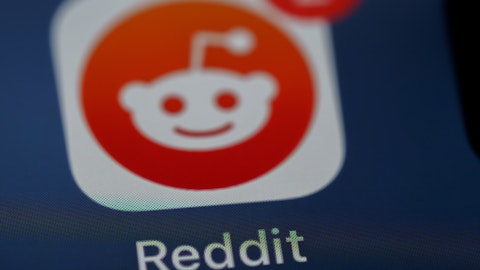In this article, we will look at the 10 Worst Marketing Stocks to Buy.
Overview of the Marketing Sector
The marketing and advertising industry is a vital part of our economy, playing multifaceted roles in facilitating market efficiency, nurturing creativity and innovation, and driving growth. According to a report by Solomon Partners, global advertising growth for 2024 is expected to fall between 4.6% and 7.2%. This amounts to nearly double the anticipated growth rate of 2%- 5% for 2023.
The Paris Olympics and impending US elections are the primary reasons behind this surge in growth anticipation. The report further highlights that out-of-home advertising is expected to have the highest ad spending growth year over year, at 7.2%. Digital ad spending takes the second spot, at 6.3%. On the other hand, print ad spending is expected to fall by 4.6% year over year.
Trends in the Marketing and Advertisement Sector
Macroeconomic improvement in the second half of 2023 and a positive economic outlook for 2024 are further expected to drive this growth. Inflation is also cooling down in 2024. In addition, the Federal Reserve cut interest rates recently by 0.5 percentage points. Since economic instability is typically cited as a primary reason behind advertisers’ spending cuts, the expectation of rising economic stability and growth is highly likely to fuel advertising spend.
A study by Dentsu revealed that the top twelve global markets are highly likely to increase their advertising spending by 13% as a percentage of GDP in 2024. This suggests that advertising spending exceeds macroeconomic growth.
According to estimates from IBISWorld, industry-wide revenue in the advertising sector has been growing at a compound annual growth rate of 2.7% over the past five years. It is expected to reach $70.1 billion by 2024, increasing by 1.9%. Profit is also anticipated to grow by 6.6%. According to a report by Mordor Intelligence, the online advertising market is valued at $257.97 billion as of 2024. It is expected to increase to $431.76 billion by 2029, growing at a compound annual growth rate of 10.97% in the forecast period.
However, with the market becoming increasingly saturated with political content, the landscape is anticipated to become more challenging for non-political companies attempting to get their message across.
Artificial Intelligence and Marketing
Similar to other areas of life, AI is changing the marketing industry at unprecedented speed. According to a January 2024 Foundation AI Survey, nearly 84.8% of the marketing pros respondents claimed to use AI in their workplace. In addition, a significant majority said that they use AI to improve their performance on a daily basis. The most common usage of AI in the industry is content creation, as cited by around 87% respondents. Other popular applications of artificial intelligence among marketing respondents included keyword research (42%), email marketing (39%), social media (39%), and note-taking (36%). When asked about the importance of AI to their job, 32% voted in favor of it being “very” important. 33% claimed it to be “Moderately” important, while 9% said that it was “very” important.
According to a report by McKinsey, around 75% of the value delivered by generative AI use cases could fall across four key areas: marketing and sales, customer operations, software engineering, and R&D. A suitable marketing use case is the application of generative AI to generate creative content, including personalized emails. The measurable outcomes of this application are likely to slash the expenditure of generating such content, along with an increase in revenue by using specially curated creative content with high efficiency. McKinsey identified 63 generative AI use cases across 16 business functions, calculating a total value of economic benefits in the range of $2.6 trillion and $4.4 trillion per annum when applied across industries. This is one of the primary reasons why marketers across the globe are scrambling to advance their AI capabilities. Marketers are increasingly leveraging AI-powered tools to personalize content for higher engagement, automate tasks, and expedite content generation, all adding to efficiency and cost-reduction.
With the value of marketing and advertising expected to skyrocket, here are the 10 worst marketing stocks to buy.

10 Worst Marketing Stocks to Buy
Our Methodology
To list the 10 Worst Marketing Stocks to Buy, we used the Finviz screener, ETFs, and related articles to compile a list of 20 marketing stocks. Next, we narrowed our list of stocks by selecting those with high short percentage of float. Finally, we ranked the stocks in ascending order of their short % of float. We also included the number of hedge funds for each stock for additional insight.
Why are we interested in the stocks that hedge funds pile into? The reason is simple: our research has shown that we can outperform the market by imitating the top stock picks of the best hedge funds. Our quarterly newsletter’s strategy selects 14 small-cap and large-cap stocks every quarter and has returned 275% since May 2014, beating its benchmark by 150 percentage points (see more details here).
10 Worst Marketing Stocks to Buy
10. Hubspot, Inc. (NYSE:HUBS)
Short % of Float: 1.71
No. of Hedge Funds as of Q2 2024: 80
HubSpot (NYSE:HUBS) is an American developer and marketer of software products for inbound marketing, customer service, and sales. provides a customer platform for businesses to grow and connect. Its unified platform offers prime connection for customer-facing teams, and includes artificial intelligence-powered engagement hubs, a connected ecosystem with more than 1,500 app marketplace integrations, a smart customer relationship management product (CRM), a community network, and educational content.
The company’s engagement hubs include Sales Hub, Marketing Hub, Operations Hub, Service Hub, Content Management System Hub, and Commerce Hub. These hubs allow companies to engage and attract clients through the customer lifecycle. Smart CRM is HubSpot’s primary layer of operations that brings customer data to AI, powering the customer platform with unified customer profiles and tools to manage and govern teams and business processes. It specializes in relating and selling to mid-market business-to-business (B2B) companies. HubSpot (NYSE:HUBS) functions on a subscription basis.
The company is running on strong fundamentals. Its revenue grew by 21% year over year in Q2 2024, with the number of total customers growing to 228,000. 11,200 net customers were added to the company’s circle in Q2 alone. The primary drivers of this growth are product enhancement and pricing improvements. In addition, it has also eased and streamlined the checkout process, allowing consumers to make clear decisions about the seats and functionality of their choice.
HubSpot (NYSE:HUBS) introduced its pricing model changes in March, lowering the price point to get started, removing seat minimums, and creating a core seat for customers who wish to edit CRM records. In turn, it recorded solid expansion trends with a multi-point net revenue increase in the third month of use. Customers on the new pricing model have the power to purchase precisely what they need, expanding as they go. This is one of the primary reasons behind its increasing popularity.
It is also delivering value for business owners looking for better visibility on customer trends and driving growth. As a result, the company is experiencing strength in starter ads and free sign ups, with more customers expanding into and starting with multiple hubs resulting in more substantial deals.
9. Yext, Inc. (NYSE:YEXT)
Short % of Float: 2.1
No. of Hedge Funds as of Q2 2024: 19
Yext (NYSE:YEXT) promotes companies’ information on websites and online search directories as part of digital marketing strategies. This AI-powered company operates an answer platform and organizes business facts to deliver actionable and relevant answers to consumer questions throughout the digital ecosystem. Specializing in Search Engine Optimization, the platform allows businesses to structure information about their brands into a database called the Knowledge Graph. The company then leverages the structured knowledge stored in the database to deliver a search experience on an organization or business’ own website. Apart from that, it also offers the same experience across more than 200 application and service providers. Yext (NYSE:YEXT) refers to them as the Publisher Network, including Apple Maps, Amazon Alexa, Bing, Facebook, Google, Cortana, Google Assistant, Google Maps, Yelp, and Siri.
Yext’s (NYSE:YEXT) platform offers several features, including Search, Pages, Listing, and others. It also offers field user support, which includes reviewing content, keeping brand guidelines in view, one-on-one training, and other support services. The company’s Q2 fiscal 2025 results shed light on its considerable margin expansion. This was driven by its focus on operational efficiency, positioning the company for continued growth and profitability. It is continuing to work on its strategic initiatives to strengthen the company in the long run.
During Q2 fiscal 2025, Yext (NYSE:YEXT) completed the acquisition of Hearsay Systems. The integration of Hearsay solutions into its portfolio increased the company’s market leadership, paving the way for the company to use its combined capabilities to accelerate and promote innovation. Hearsay Systems’ compliance-driven solutions can uniquely optimize customer interactions, expand reach, and ensure brand and regulatory compliance. Integrating Hearsay’s text, social media, voice, and compliance features with Yext’s AI technology and digital presence management is expected to give the company an exceptional tools kit. This kit is expected to help boost performance across all channels and manage customer touchpoints.
Yext (NYSE:YEXT) now holds a competitive advantage in the industry, with its boosted value enabling solid CRM integration, including systems such as Salesforce, Inc. (NYSE:CRM). To further enhance value, the company will track client interactions, synchronize contact information, and automate workflows to provide businesses with performance improvement recommendations and customer journey insights.
Yext (NYSE:YEXT) recently announced the launch of Yext Social, an AI-powered social media management solution that metamorphoses local customer engagement at scale globally by brands. Yext Social offers personalized, data-driven content on a single platform, enabling brands to connect with customers locally. This marks a significant expansion of the Yext platform, further establishing its position in the industry. Using advanced AI technology, Yext Social delivers actionable insights, optimizes engagement strategies, and simplifies content creation. This helps brands easily manage their local and corporate social media segments using just the Yext platform.





